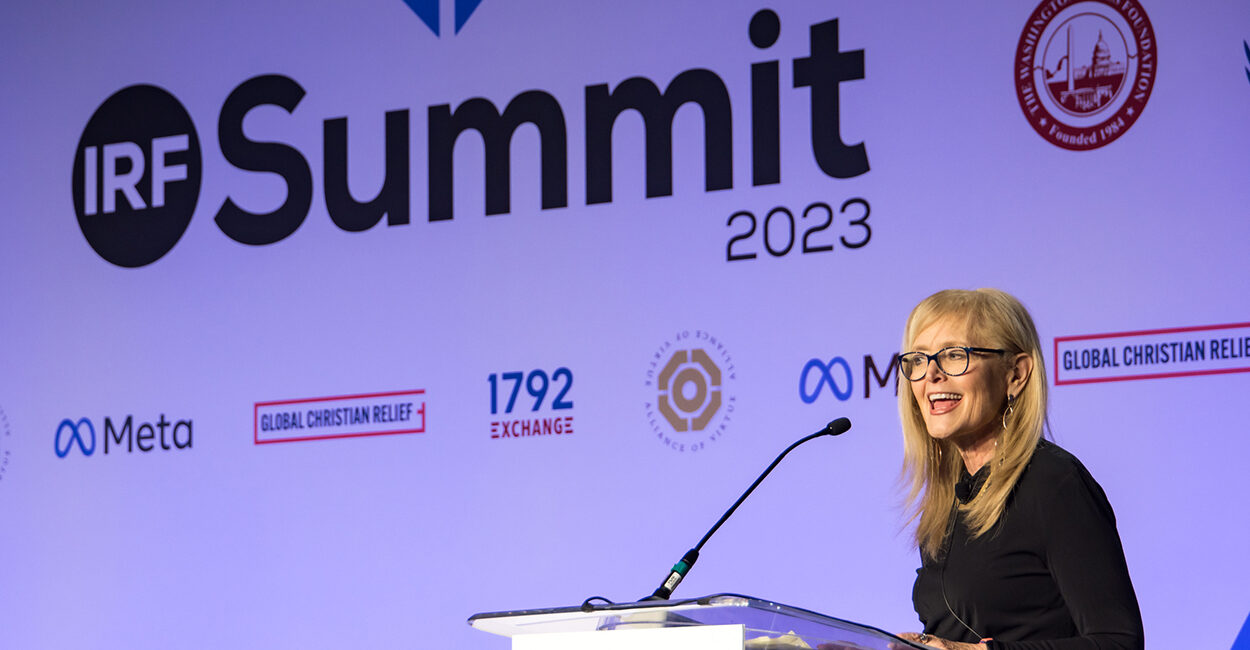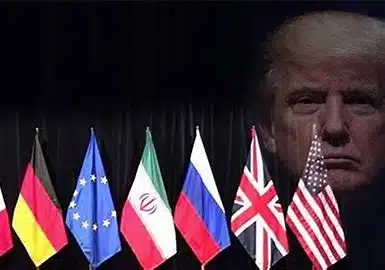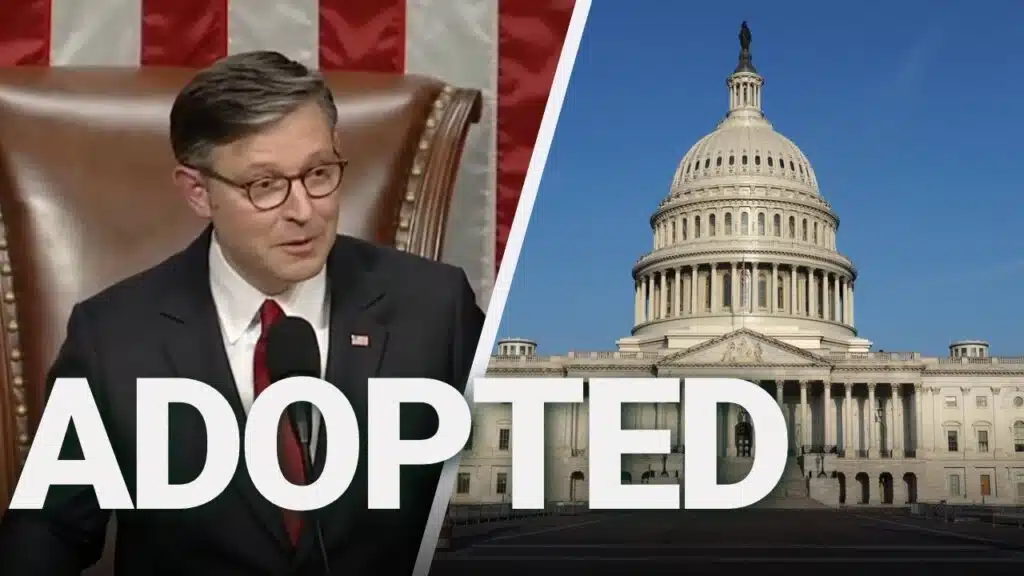
Leftist Group Slams Religious Freedom Summit for ‘Hate’; Democrat Responds
Katrina Lantos Swett, founder of the Lantos Foundation and a co-chair of the International Religious Freedom Summit that took place in Washington, D.C., earlier this month, responded to the Southern Poverty Law Center’s attack on the summit in a statement to The Daily Signal on Tuesday.
The SPLC, a left-leaning advocacy group notorious for branding mainstream conservative and Christian organizations “hate groups” and placing them on a map with chapters of the Ku Klux Klan, attacked the summit for providing “a platform for multiple anti-LGBTQ+ hate groups and personalities who cloak their hate in religious rhetoric.” The SPLC highlighted organizations it has branded “hate groups” and other conservative Christians who oppose the LGBT agenda.
Lantos Swett, a lifelong Democrat, co-chaired the Jan. 31-Feb. 1 summit alongside Republican Sam Brownback, a former Kansas governor, senator, and ambassador-at-large for religious freedom under then-President Donald Trump. She expressed her appreciation for some of the SPLC’s work but chided the group for missing the mark in this instance.
“While I appreciate much of the important work done by the Southern Poverty Law Center in past years, I think SPLC sometimes misses the mark in its critique of important advocacy work that does not fully align with its views. This is clearly one such instance,” Lantos Swett told The Daily Signal.
“The IRF Summit, a civil society gathering with more than 70 partners, is not about highlighting the issues that divide us, but rather bringing us together to work on one key issue that can unite us: the fundamental right to freedom of religion, conscience, and belief,” the summit co-chair added. “I am deeply committed, as I know my Co-Chair Ambassador Sam Brownback is, to building a global movement for international religious freedom that is bipartisan, indeed nonpartisan, and the IRF Summit reflects this commitment.”
“The 2023 Summit partners comprised a culturally, religiously, and politically diverse group—and this is by design,” Lantos Swett added. “To be certain, there are many issues on which my views do not align with or are even in opposition to those of my summit co-chair or summit partners. But those differences do not preclude us working together in positive ways on the issue where we can find common ground.”
“The IRF movement is growing every day, and I believe one of its greatest strengths is that it manages to transcend partisan politics and bring people together, despite their strong differences of opinion in other areas,” she concluded.
The International Religious Freedom Summit highlighted persecution of Kyiv-aligned Christians in Ukraine, Christians in Nigeria, and many religious minorities—particularly Uyghur Muslims and Tibetan Buddhists—in China. Members of atheist, Baha’i, Falun Gong, Hindu, Jewish, Muslim, Sikh, and Yazidi organizations took part in the summit, as did Christian minorities such as Assyrians.
The SPLC repeatedly condemned many of the summit’s organizers and sponsors as “extremists” who abuse claims of religious freedom to “discriminate” against people who identify as LGBT.
R.G. Cravens, a senior research analyst for the SPLC’s Intelligence Project (the project it used to monitor the Klan and later expanded to target conservative groups) who wrote the SPLC article, appeared to reject any definition of religious freedom that would protect “white, straight, cisgender, conservative Christians.” He wrote:
Although summit co-chairs have said that religious freedom means ‘the profound right of all people to live their lives in accordance with the dictates of their own conscience,’ the extremists sponsoring and participating in the summit define religious freedom as the legal privilege of white, straight, cisgender, conservative Christians to discriminate against those who do not share their beliefs. We reject that definition.
Religious freedom should be a shield against targeted discrimination—not a sword to thwart the rights and liberties of LGBTQ+ persons and religious minorities.
Cravens attacked Brownback repeatedly. He accused Brownback of writing an op-ed including “white and Christian supremacist dog whistles about threats to ‘Western culture.’” He also presented Brownback’s orders prohibiting the government from discriminating against clergy who refuse to solemnize same-sex weddings as enabling discrimination, and he faulted Brownback for signing a law enabling religious groups at state universities to abide by their own rules on sexuality issues.
He also condemned the Family Research Council, a conservative Christian nonprofit in Washington, D.C., which suffered a terrorist attack in 2012 due to its presence on the SPLC’s “hate map,” and Alliance Defending Freedom, a premier religious freedom nonprofit that has won multiple cases before the Supreme Court. The SPLC has branded each organization a “hate group,” repeating claims that the organizations have repeatedly debunked.
Cravens also singled out Franklin Graham, because the organizations he leads—Samaritan’s Purse and the Billy Graham Evangelistic Association—sponsored the event. He also attacked Liberty University School of Law and former Vice President Mike Pence’s organization, Advancing American Freedom.
As I explain in my book “Making Hate Pay: The Corruption of the Southern Poverty Law Center,” the SPLC took the same Intelligence Project it used to bankrupt Klan groups and weaponized it against conservatives, partially to scare donors into ponying up cash and partially to silence ideological opponents.
After the SPLC fired its co-founder amid a racial discrimination and sexual harassment scandal in 2019, a former staffer claimed that the SPLC’s accusations of “hate” are a “cynical fundraising scam” aimed at “bilking northern liberals.” Critics across the political spectrum have voiced opposition and alarm at the organization’s hate group smears.
A terrorist even targeted the Family Research Council in 2012, and he told the FBI he used the “hate map” to find his target. The SPLC condemned that act of terror, but kept FRC on the list and the map—and Cravens dedicated five paragraphs of his article to FRC and its president, Tony Perkins.
This post originally appeared at The Daily Signal.



